Researchers' Foreign-Language Publications
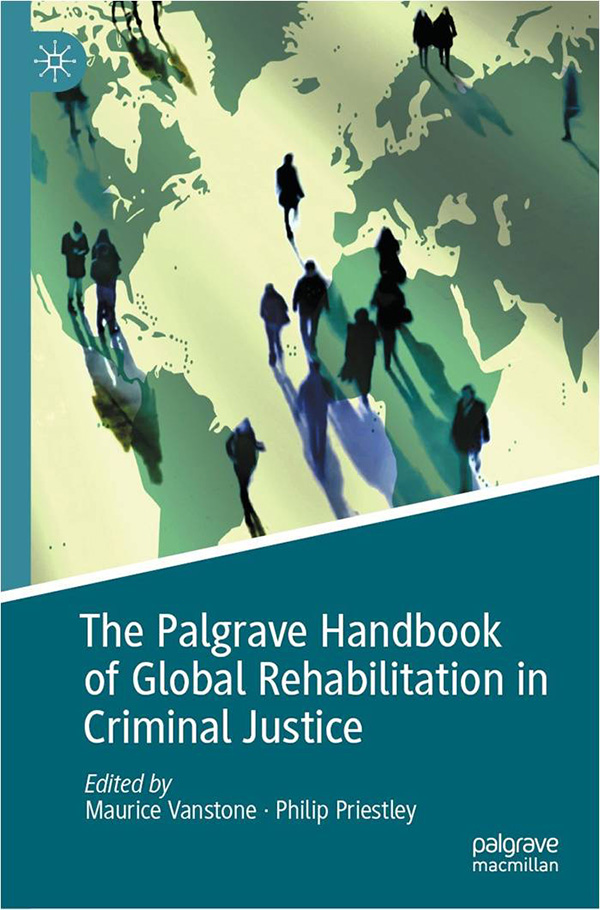 |
Maurice Vanstone – Philip Priestley (eds.): The Palgrave Handbook of Global Rehabilitation in Criminal Justice Klára Kerezsi – Judit Szabó: |
This handbook provides a unique overview of rehabilitation as practiced internationally in criminal justice. Through the contributions of a diverse group that includes, among others, academics (some of whom are former practitioners), research students, a judge, and a probation chief, it reflects common features of criminal justice in different countries and documents their diversity and celebrates their vitality. In recent times the idea of ‘law and order’ has been expropriated by populist, authoritarian and doctrinaire regimes, almost always and nearly everywhere in the service of arbitrary and unjust rule. By and large this handbook does not include such regimes. But ‘law’ itself also has the capacity to constrain rulers, and ‘order’ in the form of social peace is a universally approved civic asset. In part, the book provides a counter-narrative demonstrating that although criminal justice dispositions such as probation, prisons, and parole can be represented as a ‘via dolorosa’, rehabilitation as illustrated in these pages can become a journey that leads by degrees towards the possibility of a better life. The handbook will be of interest to students, academics, practitioners, managers, policy makers and all those who wish to gain insight into the why and the how of rehabilitation in criminal justice systems across the world.
[Palgrave Macmillan, Cham, 2022, ISBN 978-3-031-14374-8]
https://link.springer.com/book/10.1007/978-3-031-14375-5?page=2#toc
♦♦♦♦♦♦
 |
Veronika Nagy – Klára Kerezsi (eds.): A Critical Approach to Police Science New Perspectives in Post-Transitional Policing Studies |
The social, economic and technological developments of the late modern society have radically changed policing approaches both at national and supranational levels. With the anti-terrorism discourse and the global crises of mobilities, the security needs of citizens is now at the pinnacle of government priorities. At the same time, traditional law enforcement faces an epistemological crisis through the digitalisation and privatization of security. Governments, and especially the police, are expected to either prevent or respond to security threats, and if necessary, to ensure order through rigorous measures. The traditional means of policing, however, is met with increasing difficulties to sustain their legitimacy on all fronts.
Regarding the current subject of public security, several challenges can be identified. The shifting relationship between organizational and management rules between the state and other governing bodies, the use of new technologies, and the fusion of different security units, such as intelligence services, the military, and the police, all contribute to new tensions in policing practices. These changes urge the need of a reflective policing science and the adaptation of existing theoretical approaches. Although several conceptual differentiations are made between policing practices, hardly any theoretical studies discuss the implication of current contextual differences between traditional welfare states and post-transitional societies.
This book provides a critical interdisciplinary approach through contextualized thematic analyses of policing practices after the digital turn. All topics are discussed from different conceptual perspectives, and will assess how digitalization, global threats and privatization have changed traditional policing approaches.
While challenging existing theoretical approaches in Anglo-Saxon policing studies, this editorial volume aims to promote critical law enforcement studies and the need for more empirical research and new conceptual methodologies in a digitized society.
[Eleven International Publishing, 2020, ISBN: 978-94-6236-887-3
https://www.boomdenhaag.nl/en/webshop/a-critical-approach-to-police-science
♦♦♦♦♦♦
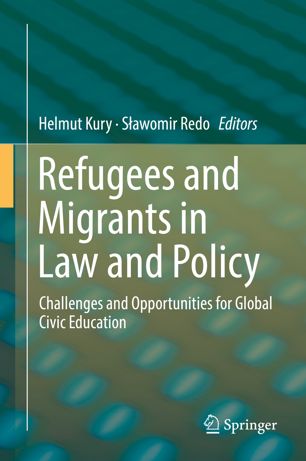 |
Helmut Kury – Sławomir Redo (eds.): Refugees and Migrants in Law and Policy Challenges and Opportunities for Global Civic Education |
Refugees and migration are not a new story in the history of humankind, but in the last few years, against a backdrop of huge numbers of migrants, especially from war-torn countries, they have again been a topic of intensive and contentious discussion in politics, the media and scientific publications. Two United Nations framework declarations on the sustainable development goals and on refugees and migrants adopted in 2016 have prompted the editors – who have a background in international criminology – to invite 60 contributors from different countries to contribute their expertise on civic education aspects of the refugee and migrant crisis in the Global North and South. Comprising 35 articles, this book presents an overview of the interdisciplinary issues involved in irregular migration around the world. It is intended for educationists, educators, diplomats, those working in mass media, decision-makers, criminologists and other specialists faced with questions involving refugees and migrants as well as those interested in improving the prospects of orderly, safe, regular and responsible migration in the context of promoting peaceful and inclusive societies for sustainable development.
Rather than a timeline for migration policies based on “now”, with states focusing on “stopping migration now”, “sending back migrants now” or “bringing in technicians or low-skilled migrant workers now”, there should be a long-term strategy for multicultural integration and economic assimilation. This book, prefaced by Francois Crépeau, the United Nations Special Rapporteur on the human rights of migrants, and William Lacy Swing, Director-General of the International Organization for Migration, addresses the question of the rights and responsibilities involved in migration from the academic and practical perspectives of experts in the field of social sciences and welfare, and charts the way forward to 2030 and beyond, and also beyond the paradigm of political correctness.
[Springer, 2020, ISBN: 978-3-319-72158-3
https://link.springer.com/book/10.1007/978-3-319-72159-0]
____________________________
Reviews:
István Tarrósy:
Helmut Kury and Slawomir Redo (eds.): Refugees and Migrants in Law and Policy
Challenges and Opportunities for Global Civic Education
Pécs Journal of International and European Law, 2020/I.
http://ceere.eu/pjiel/?book=vol-2020-i
Stauber Péter: Mi a baj a migrációval?
Belügyi Szemle, 2019/12., p. 121–124
https://belugyiszemle.hu/hu/belugyi-szemle-fooldal
♦♦♦♦♦♦
This edited volume traces the rise of far right vigilante movements – some who have been involved in serious violence against minorities, migrants and other vulnerable groups in society, whereas other vigilantes are intimidating but avoid using violence. Written by an international team of contributors, the book features case studies from Western Europe, Eastern Europe, North America and Asia. Each chapter is written to a common research template examining the national social and political context, the purpose of the vigilante group, how it is organized and operates, its communications and social media strategy and its relationship to mainstream social actors and institutions, and to similar groups in other countries. The final comparative chapter explores some of the broader research issues such as under which conditions such vigilantism emerges, flourishes or fails, policing approaches, masculinity, the role of social media, responses from the state and civil society, and the evidence of transnational co-operation or inspiration. This is a groundbreaking volume which will be of particular interest to scholars with an interest in the extreme right, social movements, political violence, policing and criminology.
[Routledge, 2020, ISBN 9781138493926
https://www.routledge.com/Vigilantism-against-Migrants-and-Minorities-OPEN-ACCESS/Bjorgo-Mares/p/book/9781138493926]
Download: https://doi.org/10.4324/9780429485619
♦♦♦♦♦♦
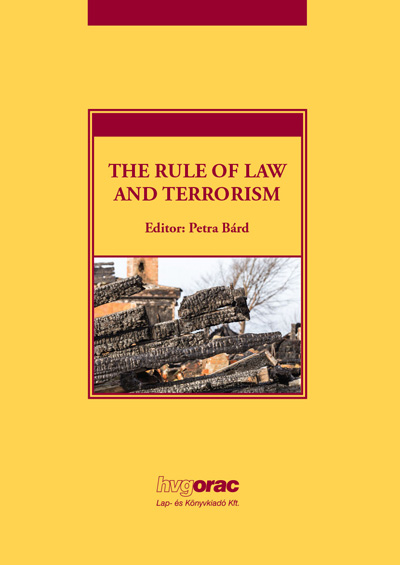 |
Petra Bárd (ed.): The Rule of Law and Terrorism
|
Authors: Petra Bárd, Samantha Joy Cheesman, Elspeth Guild, Péter Hack, Michael Hamilton,
Konrad Lachmayer, András Sajó, Stefan Schumann, Ulrich Sieber, Judit Tóth, Varju Márton
The relevance of the present volume on terrorism and the rule of law is constantly and unavoidably around us. The authors first seek to identify theoretical considerations and their practical implications starting with broad social and legal science concepts that boil down to legislation and decision-making. Next the book’s focus narrows down to Europe first, and to the European Union and the European Court of Justice later. Finally, a Hungarian case-study is included to illustrate the points that have been addressed in the theoretical chapters.
Identifying EU counter-terrorism law is not an easy endeavor. It is multidisciplinary, inspired by constitutional, criminal and administrative law and security studies. The EU’s multi-layered structure, the absence of its coercive powers and the necessary reliance on its Member States not sharing a uniform opinion only complicate things further. Nevertheless these have not prevented the EU from having a significant impact in the field of anti-terrorism. It is against this background that the authors made an intelligent attempt to re-imagine anti-terrorist legislation that may contribute to the deepening of an ever closer community based on shared values, including the rule of law and a fundamental rights culture.
Professor em. László Valki
Department of Public
International Law Eötvös Lorand University
[HVG-ORAC Publishing House Ltd., Budapest, 2015, ISBN: 978 963 258 260 3]
♦♦♦♦♦♦
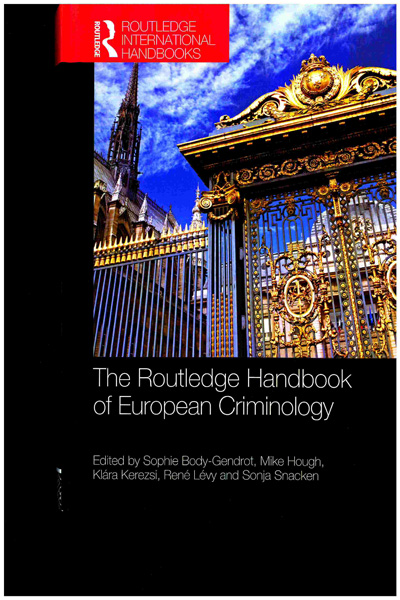 |
Sophie Body-Gendrot – Mike Hough – Klára Kerezsi –
|
This new book brings together some of the leading criminologists across Europe, to showcase the best of European criminology. The Handbook aims to reflect the range and depth of current work in Europe, and to counterbalance the impact of the – sometimes insular and ethnocentric – Anglo-American criminological tradition. The end-product is a collection of twenty-eight chapters illustrating a truly comparative and interdisciplinary European criminology.
The editors have assembled a cast of leading voices to reflect on differences and commonalities, elaborate on theoretically grounded comparisons and reflect on emerging themes in criminology in Europe. After the editors’ introduction, the book is organised into the three parts:
- five chapters offering historical, theoretical and policy-oriented overviews of European issues in crime and crime control,
- seven chapters looking at different dimensions of crime in Europe, including crime trends, state crime, gender and crime and urban safety,
- fifteen chapters examining the variety of institutional responses, exploring issues such as policing, juvenile justice, punishment, sentencing, trust in justice, media and crime, drugs, terrorism, immigration and data-processing.
This book gives some indication of the richness and scope of the emerging comparative European criminology. It will be required reading for anyone who wants to understand trends in crime and its control across Europe. It will be a valuable teaching resource, especially at postgraduate level, as well as an important reference point for researchers and scholars of criminology across Europe.
Sophie Body-Gendrot is Professor Emeritus at University Paris-Sorbonne and a researcher at the Centre de Recherches Sociologiques sur le Droit et les Institutions Pénales (CESDIP–CNRS–French Ministry of Justice).
Mike Hough is Professor of Criminal Policy, and Director of the Institute for Criminal Policy Research at Birkbeck College, London, UK.
Klára Kerezsi is Senior Advisor and Senior Researcher at the National Institute of Criminology and Associate Professor at ELTE University, Hungary.
René Levy is Senior Researcher Director at CNRS, France, and Director of the Groupe Européen de Recherches sur les Normativités (GERN).
Sonja Snacken is Professor of Criminology at the Free University, Brussels.
[Routledge, 2014, ISBN: 978-0-415-68584-9]
♦♦♦♦♦♦
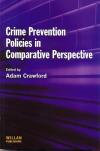 |
Adam Crawford (Ed.):
|
The editor:
Adam Crawford is Professor of Criminology and Criminal Justice and Director of the Centre for Criminal Justice Studies at the University of Leeds.
The contributors:
Adam Crawford, Jaap de Waard, Adam Edwards, Patrick Hebberecht, Alistair Henry, Tim Hope, Gordon Hughes, Michael Jasch, Klára Kerezsi, Dario Melossi, Rossella Selmini, Margaret Show, Jan J.M. Van Dijk, Anne Wyvekens
For the past two decades or more the growth of public policies and strategies aimed at crime prevention and community safety has constituted one of the major innovations in crime control, with significant implications for the manner in which crime and safety are governed. But how has ‘the preventive turn’ in crime control policies been implemented in various different countries and what have its implications been? What lessons have been learnt over the ensuing years and what are the major trends influencing the direction of development? What does the future hold for crime prevention and community safety? These are some of the questions explored in this book through a comparative analysis of developments in crime prevention policies across a number of European countries. Contributors explore and assess the different models adopted and the shifting emphasis accorded to differing strategies over time. The book also seeks to compare and contrast different approaches as well as the nature and extent of policy transfer between jurisdictions and the internationalisation of key ideas, strategies and theories of crime prevention and community safety.
The book brings together a collection of leading international experts to explore the lessons learnt through implementation, and the future directions of crime prevention policies. Many of the contributors have been closely involved in crime prevention and community safety policy development and research in different countries. As such, they are well placed to reflect upon developmental trajectories over the last quarter of a century, as well as to draw out the underlying influences that have shaped such changes.
[Willan Publishing, Devon, 2009]
♦♦♦♦♦♦
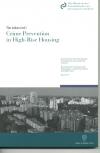 |
Tim Lukas (Ed.):
Lessons from the Crime Prevention Carousel |
Authors: Tünde Barabás, Mark Enters, Krzysztof Krajewksi, Tim Lukas, Henry Shaftoe, Nicole Smits, Szandra Windt, Tobias Woldendorp
Summary
Large, densely constructed high-rise housing estates at the fringes of cities are particularly regarded as urban areas that exhibit a severe potential for crime and insecurity. Rehabilitation schemes have therefore been increasingly utilised for remedial schemes in suburban housing during the past years.
Are attempts to rehabilitate high-rise housing estates actually an effective way to reduce crime and feelings of insecurity in areas of this nature? This is the pivotal question of the Crime Prevention Carousel, an international comparative study which seeks to explore physical improvements and social changes at six high-rise housing estates in five Eastern and Western European countries. Focusing on both situational and social approaches to crime prevention the study aims to share information and experiences about how best to reduce neighbourhood crime and feelings of insecurity in high-rise residential housing estates.
[Kriminologische Forschungsberichte, Berlin, Duncker & Humblot, 2007, 132 p.]
